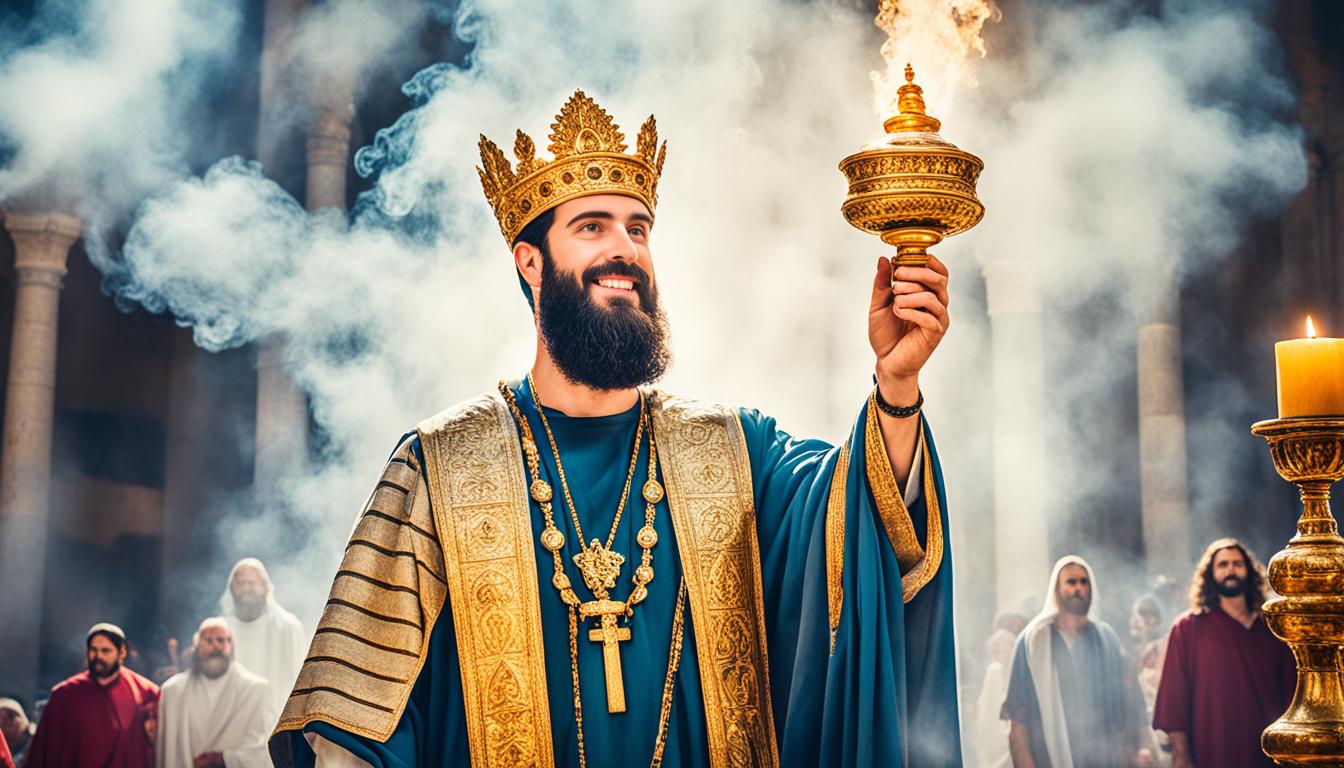Aaron, a prominent figure in the Bible, holds a significant place in Hebrew history. While often overshadowed by his brother Moses, Aaron played a crucial role in the Old Testament, particularly in the Book of Exodus. As the father of the Levites and the High Priest of Israel, Aaron’s contributions and responsibilities were vital in guiding the Israelites through their journey.
Aaron’s relationship with Moses was one of trust and support, as they worked together to lead the Israelites out of Egypt during the Exodus. Serving as a leader alongside Moses, Aaron helped demonstrate God’s divine guidance and deliverance to the Hebrew people.
As the first Levitical priest, Aaron carried out essential priestly duties, including offering sacrifices and maintaining the Tabernacle. His duties symbolized his consecration and spiritual leadership among the Israelites.
Despite his important role, Aaron struggled with insecurities and made mistakes. One notable incident was his involvement in the creation of the golden calf when pressured by the Israelites. This serves as a reminder that even influential leaders can face challenges and give in to human weaknesses.
Aaron’s staff held great significance, symbolizing his divine authority as the high priest. It blossomed miraculously and was even placed in the Ark of the Covenant, alongside other sacred artifacts.
Aaron’s family, known as the Aaronites, continued his priestly legacy. His sons assisted in the priestly duties, ensuring the perpetuation of the Levitical priesthood for generations to come.
After Aaron’s passing, his son Eleazar succeeded him as the high priest, marking the transition of the priestly mantle. Aaron’s legacy as the first high priest of Israel continues to resonate, emphasizing the importance of faith, obedience, and trust in God’s appointed leaders.
Key Takeaways:
- Aaron played a crucial role in the Exodus and held the esteemed position of High Priest.
- He supported his brother Moses and contributed to the leadership of the Israelites.
- Aaron was the first Levitical priest and carried out important priestly duties.
- Despite insecurities, Aaron’s staff symbolized his divine authority as the high priest.
- Aaron’s family continued the priestly tradition, ensuring its legacy for generations to come.
Aaron in the Bible Is Moses’ Older Brother
Aaron, the older brother of Moses, played a vital role in supporting his younger brother during their journey in Egypt and leading the Israelites. Their sibling relationship was of immense importance, as Aaron’s presence gave Moses the confidence he needed to step into his role as the chosen leader.
Throughout the story of Exodus, Aaron stood by Moses’ side, offering guidance and assistance. When Moses hesitated to confront Pharaoh, it was Aaron who served as his spokesperson. Together, they faced the Egyptian ruler, demanding the release of the Israelites.
During the Israelites’ escape from Egypt, Aaron continued to provide support. He played a crucial role in the miracles and plagues that befell Egypt. As they journeyed through the wilderness, Aaron’s presence reassured both Moses and the Israelites.
Aaron’s role in the Exodus extended beyond being a supportive brother. As the older sibling, he brought with him a sense of authority and experience. This dynamic allowed Moses to grow in confidence and fulfill his divine calling without doubt or hesitation.
Aaron’s importance as Moses’ older brother cannot be overstated. His unwavering support and guidance provided the foundation upon which Moses built his leadership. Together, they navigated the challenges of leading the Israelites out of bondage, ensuring the success of their mission.
The relationship between Aaron and Moses serves as a profound example of the power of sibling bonds. Their united front and shared sense of purpose created a formidable team, ultimately leading to the liberation of the Israelites and the establishment of their nation.
| Role | Importance | Examples |
|---|---|---|
| Supporting Moses | Provided guidance and assistance | Speaking on Moses’ behalf to Pharaoh |
| Reassuring the Israelites | Boosted morale and confidence | Performed miracles and plagues in Egypt |
| Empowering Moses | Gave Moses confidence in his leadership | Guided Moses through the challenges of the Exodus |
Aaron Is the First Levitical Priest
Aaron, a significant figure in the Bible, was chosen by God to serve as the first high priest of Israel. His appointment marked the establishment of the Levitical priesthood, a sacred institution that played a central role in the religious practices of the Israelites. As the high priest, Aaron carried out various priestly duties and responsibilities, fulfilling his role as the spiritual leader of the community.
One of Aaron’s key responsibilities was offering sacrifices on behalf of the people. He facilitated the process of atonement, serving as a mediator between God and the Israelites. Aaron followed the intricate rituals and regulations outlined by God, ensuring that the sacrifices adhered to the divine requirements.
Additionally, Aaron had the vital task of maintaining the Tabernacle, the portable sanctuary that was central to Israelite worship. He oversaw its construction, ensuring that it was a sacred space where the presence of God dwelled among His people. The Tabernacle served as a focal point for the Israelites’ offerings, prayers, and worship.
As the high priest, Aaron wore special priestly garments that distinguished him from the rest of the community. These garments symbolized his consecration and represented his unique role as the spiritual leader. The attire consisted of intricate details and specific elements, such as the ephod, breastplate, and turban.
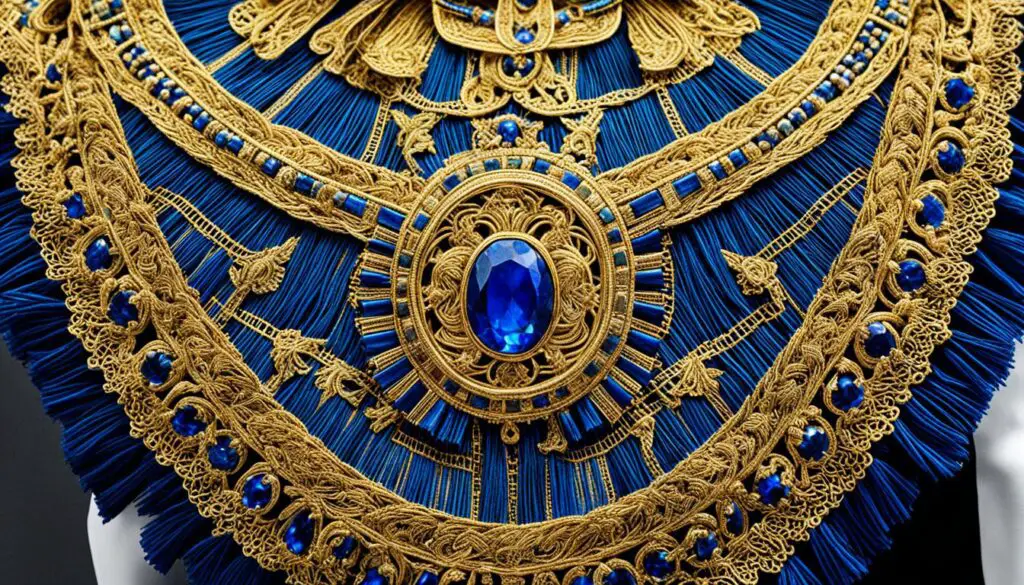
“Aaron’s appointment as the first high priest of Israel marked the beginning of the Levitical priesthood, establishing a system of worship and spiritual leadership that would endure for centuries.”
| Priestly Duties and Responsibilities | Tabernacle | Priestly Garments |
|---|---|---|
| Offering sacrifices | Construction and maintenance | Distinctive attire |
| Mediating between God and the people | Symbol of God’s presence | Ephod, breastplate, turban |
| Following divine regulations | Center of worship | Consecration and symbolism |
Aaron’s appointment as the first high priest of Israel marked the beginning of the Levitical priesthood, establishing a system of worship and spiritual leadership that would endure for centuries. His faithful execution of priestly duties, unwavering commitment to the maintenance of the Tabernacle, and the significance of his priestly garments all contributed to the spiritual foundation of the Israelite community.
Aaron Struggles with Insecurity
Despite his esteemed position as the high priest, Aaron in the Bible was not immune to insecurities. In the midst of his important role in leading the Israelites, he experienced bouts of jealousy and doubts. This vulnerability reminds us that even those in positions of power can grapple with their own internal struggles.
One of the most notable instances of Aaron’s insecurity is seen during the infamous golden calf incident. Under pressure from the impatient Israelites, Aaron gave in to their demands and crafted a golden calf for them to worship in the absence of Moses, who was consulting with God on Mount Sinai. This act of disobedience showcased Aaron’s uncertainty and the extent to which he was swayed by the opinions of others.
It is natural for individuals, regardless of their influence or status, to experience moments of doubt and insecurity. Aaron’s story serves as a reminder that even the most renowned biblical figures faced their own internal battles. This humanizing portrayal highlights the complexities of leadership and the importance of self-reflection and personal growth.
“For when I am weak, then I am strong.” – 2 Corinthians 12:10
As we delve deeper into the narrative of Aaron in the Bible, we uncover the multifaceted nature of human emotions and how they can impact even those in positions of authority. It is through these challenges and struggles that we can find strength and grow in our faith, ultimately forging a path towards personal transformation.

Aaron’s Staff Was in the Ark of the Covenant
One of the key symbols of Aaron’s divine authority as the high priest was his miraculous staff. This staff served as a powerful demonstration of God’s chosen leadership.
According to the biblical account, Aaron’s staff blossomed miraculously, affirming his role as the high priest and symbolizing his connection to divine authority. This incredible event showcased Aaron’s unique position and affirmed God’s presence and guidance in Israel’s history.
The significance of Aaron’s staff extends beyond its miraculous transformation. It played a central role in the Ark of the Covenant, a sacred repository that housed various important items representing the presence and covenant between God and the Israelites.
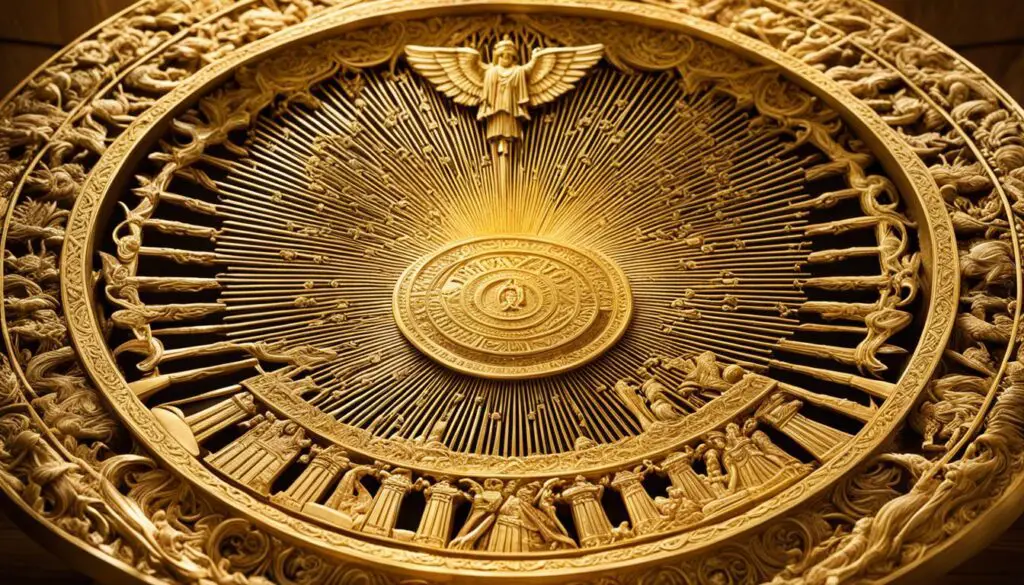
The Ark of the Covenant was a symbolic representation of God’s presence and holiness. It contained the stone tablets inscribed with the Ten Commandments, a jar of manna, and Aaron’s staff. Placing Aaron’s staff inside the Ark emphasized its importance and highlighted Aaron’s pivotal role as the high priest and spiritual leader of the Israelites.
The staff’s presence alongside the tablets of the Ten Commandments and the reminder of God’s provision through the manna emphasized the divine authority entrusted to Aaron and the significance of his role in Israel’s religious practices.
This powerful symbol of Aaron’s authority serves as a reminder of the importance of divine guidance and the role of chosen leaders in religious and historical contexts.
Aaron’s Family and Descendants
Aaron’s family, known as the Aaronites, carried on the prestigious legacy of the Levitical priesthood and played essential roles in the religious practices of Israel. His descendants inherited the responsibility of serving as priests and ensuring the continuation of the sacred traditions established by Aaron himself.
Aaron’s sons, Eleazar and Ithamar, followed in their father’s footsteps, assisting in the priestly duties and contributing to the spiritual life of the nation. They shared the immense responsibility of upholding the Levitical priesthood and conveying God’s laws and teachings to the Israelites.
Through the generations, Aaron’s descendants preserved the principles and customs that formed the foundation of Israel’s worship. They were entrusted with the sacred duty of leading the people in their spiritual journey and maintaining their connection to God.
Aaron’s family legacy extended beyond the priesthood as well. They played integral roles in various aspects of Israel’s society, serving as leaders, judges, and teachers of the Law. Their involvement helped shape the religious and cultural landscape of the Hebrew nation.
Today, the impact of Aaron’s family and their contributions to Israel’s religious heritage can still be seen and felt. Their unwavering commitment to God’s service and their dedication to preserving the integrity of the Levitical priesthood have left an indelible mark on Hebrew history.
Descendants of Aaron’s Sons
| Descendant | Role/Title |
|---|---|
| Phinehas | High Priest during the time of the Judges |
| Abishua | High Priest during the time of David |
| Azariah | High Priest during the reign of King Solomon |
| Jehozadak | High Priest during the Babylonian exile |
| Joshua | High Priest during the rebuilding of the Temple in Jerusalem |
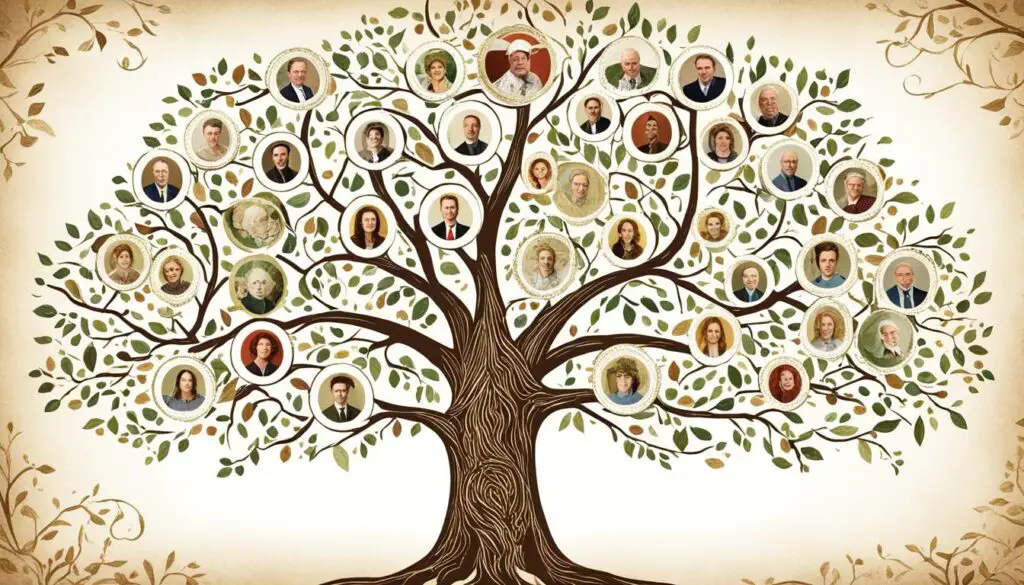
Aaron’s Demise and Legacy
After a life dedicated to serving as the high priest of Israel, Aaron’s journey came to an end. His passing marked a significant transition in the priesthood, as his son Eleazar stepped into his father’s role. The passing of the high priesthood from father to son symbolized the continuation of Aaron’s legacy and the continued faithfulness of God’s appointed leaders.
Aaron’s death was a poignant moment in Hebrew history, as it marked the end of an era. His unwavering faith and obedience throughout his life left an indelible mark on the nation, inspiring future generations to follow in his footsteps.
In his role as the first high priest, Aaron laid the foundation for the Levitical priesthood and established the rituals and practices that would shape Israel’s worship of God for centuries to come. His commitment to following God’s instructions in maintaining the Tabernacle and offering sacrifices set a standard of devotion and reverence.
The legacy of Aaron in the Bible extends beyond his role as a religious leader. His struggles with insecurity and moments of weakness serve as a reminder that even those in positions of authority have their flaws. Aaron’s story teaches valuable lessons about the complexities of human nature and demonstrates the importance of humility and repentance.
As we reflect on Aaron’s life and legacy, his story compels us to examine our own faith, obedience, and trust in God’s appointed leaders. Aaron set an example of steadfast devotion and loyalty, reminding us of the immense impact one person can have on future generations.
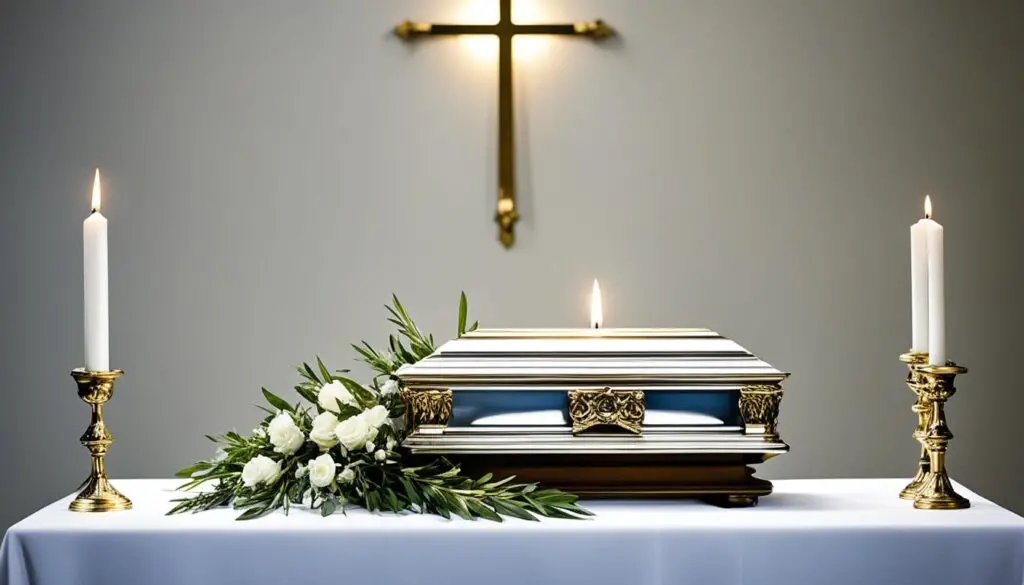
Conclusion
Aaron’s role in the Bible transcends that of being Moses’ sidekick. He personifies dedication, faith, and the transformative power of God’s grace. His life serves as a poignant reminder of the indispensability of strong leadership, unwavering humility, and obedience to one’s divine calling.
Aaron’s legacy in the Levitical priesthood is of immeasurable significance. Through his unwavering commitment to his priestly duties, he left an indelible mark on Hebrew history. His unwavering faith and obedience to God’s commandments set a remarkable precedent for generations to come.
Studying Aaron’s life offers valuable lessons to individuals of all ages and backgrounds. His unwavering trust in God, despite his insecurities and personal struggles, serves as a beacon of hope and inspiration. Aaron’s life showcases the power of faith in overcoming obstacles and the potential for transformation through God’s grace.
As we reflect on Aaron’s life, we are reminded of the importance of leadership rooted in humility and obedience. The lessons gleaned from his story encourage us to embrace our own God-given roles, faithfully fulfill our responsibilities, and trust in the divine guidance that accompanies our journey. Aaron’s enduring impact on Hebrew history demands recognition, celebration, and the continuous exploration of the invaluable lessons he imparts.
